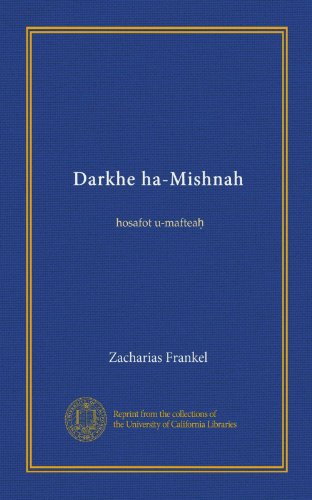Background
Zacharias Frankel was born in Prague, Czech Republic on September 30, 1801.



(This book was digitized and reprinted from the collection...)
This book was digitized and reprinted from the collections of the University of California Libraries. It was produced from digital images created through the libraries mass digitization efforts. The digital images were cleaned and prepared for printing through automated processes. Despite the cleaning process, occasional flaws may still be present that were part of the original work itself, or introduced during digitization. This book and hundreds of thousands of others can be found online in the HathiTrust Digital Library at www.hathitrust.org.
http://www.amazon.com/gp/product/B007Z0XGJU/?tag=2022091-20
Zacharias Frankel was born in Prague, Czech Republic on September 30, 1801.
After studying the Talmud, Zecharias attended the University of Budapest, graduating in 1831.
Zecharias Frankel was one of the founders of the Breslau school of " historical Judaism. " This school attempts to harmonize the critical treatment of the documents of religion with fidelity to traditional beliefs and observances. Frankel served as rabbi in several German communities, becoming chief rabbi of Dresden in 1836. During this period he developed a theology that he called positive-historical Judaism. It differed from Orthodoxy in its acceptance of scientific and historical research and in its willingness to make some liturgical changes. It differed from Reform Judaism in that it sought to maintain traditional customs and adhere to the national aspects of Judaism. In 1854 Frankel was chosen the president of the newly organized Jewish theological seminary at Breslau, which became and remained one of the most important modern European institutions for the training of rabbis until the Nazi period. Through the faculty and students of Breslau seminary, Frankel’s viewpoint became highly influential in central Europe. In the 20th century it took root in the United States, where, under the name of Conservative Judaism, it attained its greatest growth. Frankel’s first major work, Die Eidesleistung der Juden (1840; “Oath-Taking by Jews”), attacked discrimination against Jews who testified in courts in Saxony. It effectively helped disprove the notion that Jews were untrustworthy in swearing oaths. Frankel also published Vorstudien zur Septuaginta (1841; “Preliminary Studies in the Septuagint”), in which he, the only major 19th-century Jewish scholar who wrote on the Septuagint (the first Greek version of the Old Testament), sought to show the necessary connection between Talmudic and Septuagintic exegesis. It is considered a classic work. He died on February 13, 1875, in Breslau.
Frankel was the founder and the most eminent member of the school of historical Judaism.
Zacharias Frankel College in Berlin is named after him. Two works he wrote in Hebrew, Darke ha-Mishnah (1859; “Introduction to the Mishna”) and Mebo ha-Yerushalmi (1870; “Introduction to the Palestinian Talmud”), were major contributions to Jewish religious thought.
(This book was digitized and reprinted from the collection...)
In religion Frankel avoided the extremes of both strict orthodoxy and radical reform. He taught his students the importance of knowing and understanding the historic forces in Judaism, and, opposing a mere negation of form and ritual, emphasized the need for a revaluation of the past in order to understand the permanent values of Judaism.
His marriage with Rachel Meyer was childless.
